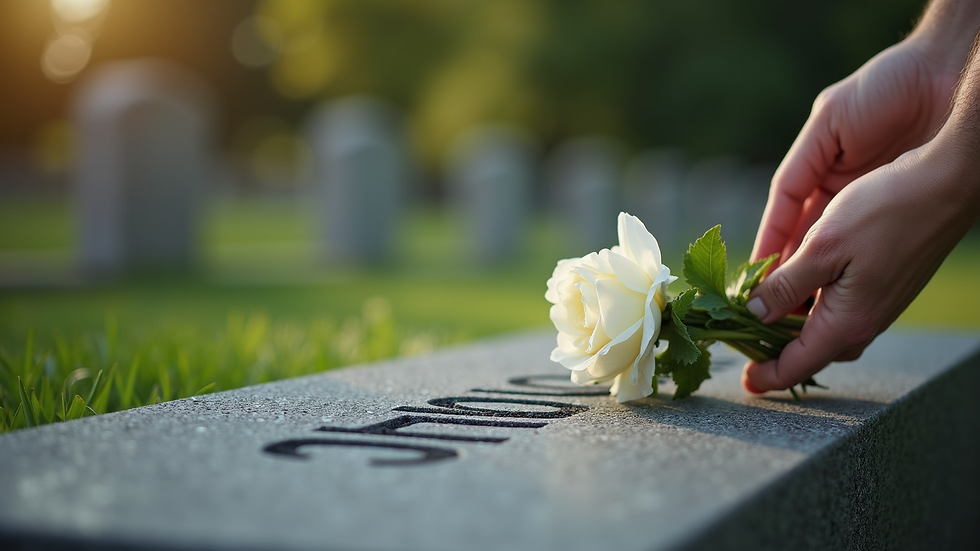Understanding the Importance of Memorials in Honouring Loved Ones
- info379471
- Aug 3, 2025
- 4 min read
Losing a loved one is one of the most profound experiences in life. It brings a mix of emotions - grief, love, remembrance, and sometimes, a need for closure. Memorials play a crucial role in this process. They provide a tangible way to honour those who have passed, helping families and friends to remember and celebrate their lives. This article explores the memorial importance in our lives, offering insights into why memorials matter and how they help us cope with loss.
The Memorial Importance in Preserving Memories
Memorials serve as lasting tributes that preserve the memory of a loved one. They are physical markers that tell stories, celebrate achievements, and keep the essence of a person alive for future generations. Whether it is a simple plaque, a garden bench, or an elaborate monument, memorials create a space for reflection and remembrance.
For example, a memorial bench in a park where a loved one enjoyed spending time can become a place for family and friends to gather and share stories. This act of remembrance helps keep the connection alive, even after the person is gone.
Memorials also provide comfort. They offer a place to visit, to feel close to the departed, and to express emotions that might be difficult to share otherwise. This is why many people find solace in visiting cemeteries or memorial gardens regularly.

How Memorials Help in the Healing Process
Grieving is a personal journey, and memorials can play a significant role in healing. They offer a focal point for grief, allowing individuals to channel their emotions constructively. Creating or visiting a memorial can be a therapeutic act, helping people to process their loss.
Memorials also encourage community support. Funerals and memorial services bring people together, fostering a sense of shared experience and mutual comfort. This communal aspect is vital because it reminds us that we are not alone in our grief.
Practical ways to use memorials for healing include:
Personalising the memorial: Adding meaningful inscriptions, symbols, or items that reflect the personality of the deceased.
Creating rituals: Lighting candles, placing flowers, or holding annual remembrance events.
Sharing stories: Encouraging family and friends to share memories at the memorial site.
These actions help transform grief into a celebration of life, making the loss more bearable.

Do you still get a gravestone if you get cremated?
Many people wonder if a gravestone is still appropriate or necessary after cremation. The answer is yes. Even if the body is cremated, families often choose to have a gravestone or memorial marker to honour their loved one.
A gravestone provides a physical location for remembrance, similar to traditional burials. It can be placed in a cemetery, a memorial garden, or even a private family plot. This marker often includes the name, dates, and a personal inscription, serving as a lasting tribute.
In some cases, families opt for a columbarium niche, which is a structure designed to hold urns. These niches can also have plaques or small gravestones attached.
Choosing a gravestone after cremation allows families to maintain a connection to the deceased and provides a place for reflection and remembrance.

The Role of Memorial Headstones in Honouring Loved Ones
One of the most traditional and enduring forms of memorial is the gravestone. Memorial headstones are more than just markers; they are symbols of respect, love, and remembrance. They provide a permanent record of a person's life and legacy.
When selecting a memorial headstone, families can choose from various materials, styles, and inscriptions to reflect the personality and values of their loved one. The inscription is particularly important as it conveys a message or sentiment that resonates with those left behind.
For those interested in exploring options, memorial headstones offer a wide range of choices, including custom designs and meaningful inscriptions.
Some tips for choosing the right memorial headstone include:
Consider the personality of the deceased - Choose symbols or words that reflect their life.
Think about the location - Some cemeteries have specific rules about size and materials.
Personalise the inscription - Use quotes, poems, or messages that hold special meaning.
Plan for longevity - Select durable materials that will withstand weather and time.
Memorial headstones provide a lasting tribute that honours the memory of loved ones in a dignified and meaningful way.
Creating a Lasting Legacy Through Memorials
Memorials are not just about remembering the past; they are about creating a legacy for the future. They inspire us to reflect on the values and lessons passed down by those who came before us.
Families can extend the memorial importance by:
Establishing scholarships or charitable funds in the name of the deceased.
Planting trees or gardens as living memorials that grow and flourish.
Creating digital memorials online to share memories with a wider community.
These actions ensure that the memory of loved ones continues to influence and inspire others.
In addition, memorials can educate younger generations about family history and heritage, fostering a sense of identity and belonging.
By honouring loved ones through memorials, we keep their spirit alive and create a meaningful connection that transcends time.
Memorials hold a special place in our hearts and communities. They help us remember, heal, and celebrate the lives of those we have lost. Whether through a simple plaque, a beautiful garden, or a carefully chosen gravestone, the memorial importance is clear - they provide a lasting tribute that honours the past and inspires the future.




Comments